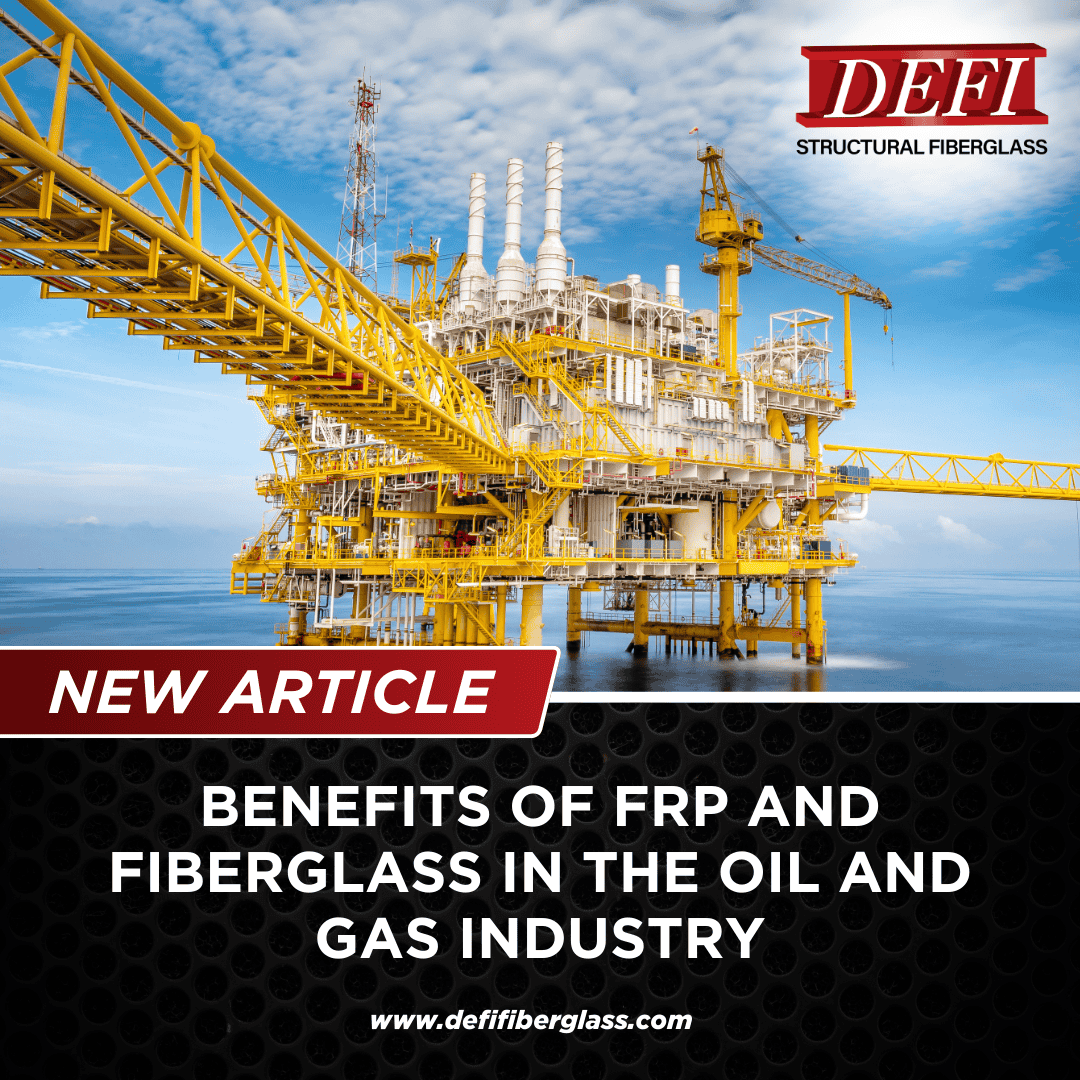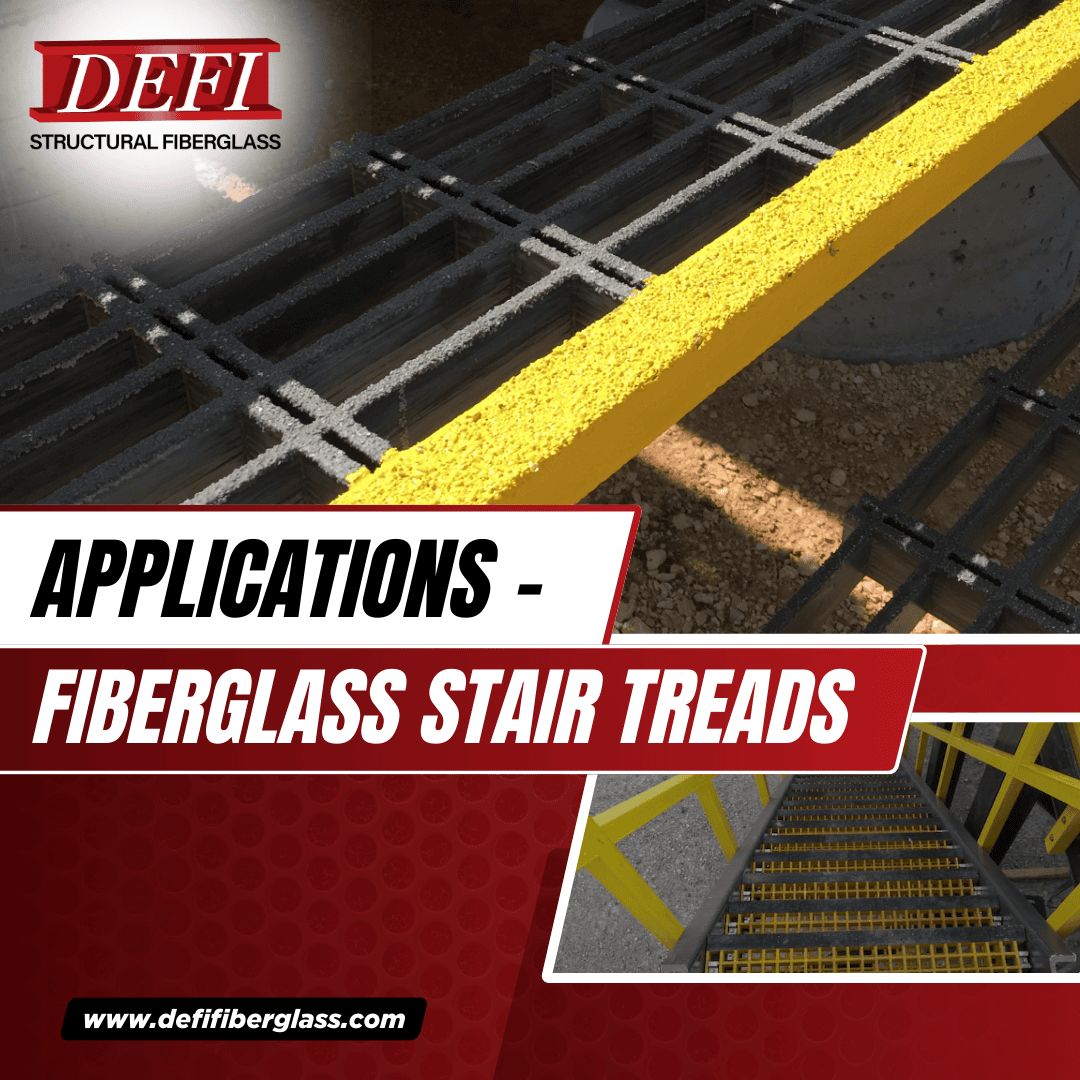The fiberglass industry that DEFI leads in is quite a varied one. With our FRP products reaching hundreds of industries in its versatile application, it’s hard to find an industry that can’t benefit from the use of fiberglass. Many of our clients, when seeking our products, know the solutions they are looking for, but honestly not many know the technology, significance, and science behind the products themselves.
WHAT IS FIBERGLASS?
Fiberglass, as the name suggests, is glass that has been spun into very fine fibers and mixed with a specific resin to give it resounding structural strength. It is a favorite of many industries due to its unique combination of strong characteristics. The top four characteristics which are often cited for motivation toward fiberglass are:
Corrosion Resistance
One of the main reasons of fiberglass products industrial popularity is the inherent resistance to corrosion. In many applications it is the only material that can survive in harsh, corrosive workplace environments.
Weight-To-Strength Ratio
From a logistical perspective among others, fiberglass really shines with its very low weight-to-strength ratio. This basically means that steel of the same strength as fiberglass will weigh seven times as much, and aluminum will weigh twice as much. This trait is especially important in terms of logistics both in shipping after purchase and installation at a plant. With steel structures, concrete often has to be reinforced to handle all the weight. With fiberglass products, installation is much easier and can be mounted anywhere without worrying about damaging structures such as rooftops or tank trailers.
Economical
FRP, hands down, is far less expensive than steel and aluminum; there is no set price difference as it depends on market conditions, application and configurations— but the savings are very significant.
Flexibility
Too often, fiberglass products are overlooked in terms of their versatility. It’s a perfect choice for so many applications because it can do things you can’t get done with other materials at the same price point. You can create all kinds of molds for fiberglass, structures and mechanical parts as well. In fact more and more industries are beginning to see the value in fiberglass as it cuts operational costs, reduces many hazards and increases efficiency. It isn’t hard to find a sector that implements fiberglass in some form or fashion to production or workplace structures of all industries such as:
- Beverage Industry: Fiberglass grating is used for platforms and bottling lines as well as smaller brew houses.
- Car Wash Industry: With the amount of water exposure car wash structures endure on a daily basis, fiberglass only makes perfect sense. Not only can it withstand the water, but it can be colored to add aesthetic value to the car wash making it look more appealing to passing motorists.
- Chemical Industry: Chemicals can be very corrosive and dangerous if someone slips and contact with the skin is made. Not only are fiberglass grating platforms being used for their non-slip characteristics, but the chemicals in each application are matched with specific resins that are resistant to that specific chemical.
- Docks & Marinas: Docks, especially in salt water bodies, can get corroded and rusted over time from the saline saturated water. Fiberglass is used for protection of these docks and prolongs the life significantly.
- Food Processing: Many people don’t realize that blood is actually corrosive. In beef and poultry processing plants fiberglass grating is used for its slip-resistance and how it resists the corrosive nature of blood.
- Aquariums: Fiberglass grating is used in aquariums of all sizes to support foundation rocks and keep them raised a bit to facilitate water circulation underneath and avoid algae buildup.
- Manufacturing: The available embedded grit texture of fiberglass grating is used in manufacturing industries such as automotive, printing and other plants where oils or liquids may be present. The extreme grip of the texture prevents slip hazards and ensures workplace safety measures are effective.
- Metals & Mines: Fiberglass grating is used in electronic refining areas due to the corrosive chemicals used. Fiberglass is not just a choice in this application but mandatory as other materials cannot be used in the same conditions.
- Power Plants: The power generation industry is one of the biggest purchasers of fiberglass products due to its nonconductive properties.
It’s not hard to see that so many industries find great value in fiberglass products and the types of industries are wildly varied across all sectors. That being said, there are two industries recently in the news that rely more heavily on fiberglass than most: Automotive and Military.
IN DEPTH: TWO INDUSTRIES WINNING WITH FIBERGLASS
These industries discussed below have adopted fiberglass in grand fashion using it in every aspect of their business for decades. When you think about their usage, the benefit to industry safety and financial savings, it is easy to see why these two featured industries are thriving with fiberglass applications:
Automotive Industry
The automotive industry is no stranger to fiberglass applications. You can find fiberglass in everything from the assembly platforms at manufacturing plants, to mechanic bays in dealership body shops. The most obvious use of fiberglass though has increased since the 1990’s and that is in the vehicles themselves. Gone are the days of the heavy, all metal gas-guzzling machines of the hot rod and big body era of vehicles. Cars need to be lighter, more fuel efficient and longer lasting. One great example is a new patent Ford Motor Company applied for earlier this year.
A patent for a new type of composite cylinder head design that will reduce weight, drastically cut manufacturing costs and save Ford money on raw materials was filed in late January. Ford’s “Hybrid Composite Cylinder Head” makes use of FRP for the internal structure rather than aluminum or cast iron.
The light weight and economical traits of fiberglass are spurring innovation from industry leaders in the automotive sector to cut costs while increasing efficiency as well.
Military
The US military has for years leaned on innovators of all industries to create faster, lighter, and stronger materials to keep our soldiers safe and maintain our position as the most advanced military in the world.
FRP products play a huge role in all aspects of military structures, battalion gear, and even prosthetics for disabled veterans. One unique twist on the prosthetic application of FRP products is set to go into testing later this month with the Army’s “Third Arm” technology. This technology is aimed at improving soldier accuracy and reduce fatigue—soldiers typically run through the most extreme temperatures with well over 100lbs of gear on.
The Army began developing the “Third Arm” concept in 2015 as a solution to make a dismounted soldier more lethal in battle. The first prototypes were developed in 2016 and thanks to fiberglass composites, weighed less than four pounds.
In an industry that requires lethal accuracy, quick speed, and superhuman endurance from soldiers, the lightweight and durable features of fiberglass are helping our military maintain legendary status among world forces.
FIBERGLASS IS THE FUTURE & DEFI IS LEADING THE CHARGE
At DEFI we have been leading the charge for the application of fiberglass products across all industries for over a decade—but our combined industry experience goes well beyond that. When you need structural fiberglass and fabrication for your workplace, no matter the industry—DEFI has you covered. Contact one of our consultants today to get your project going with DEFI structural fiberglass products.



